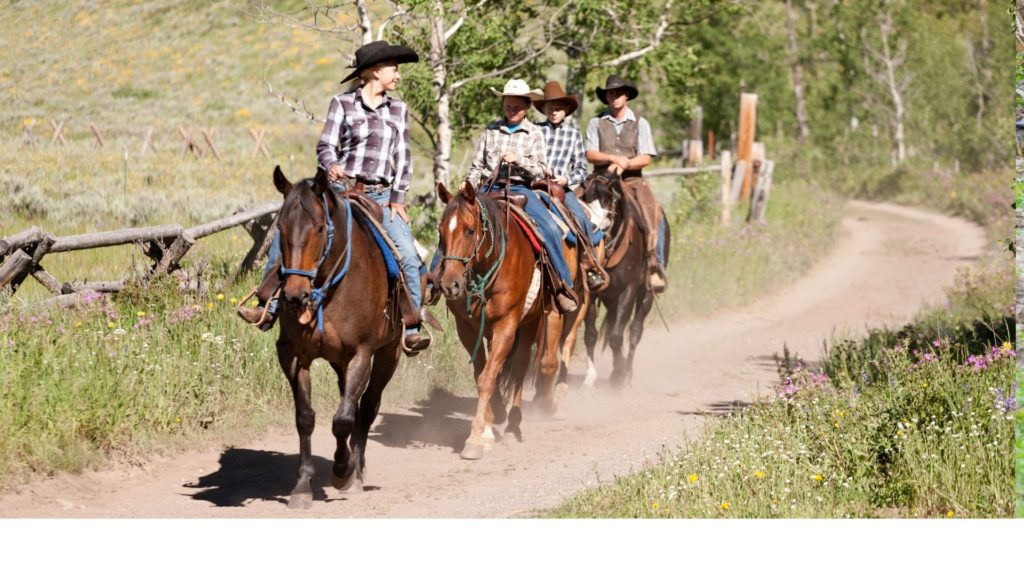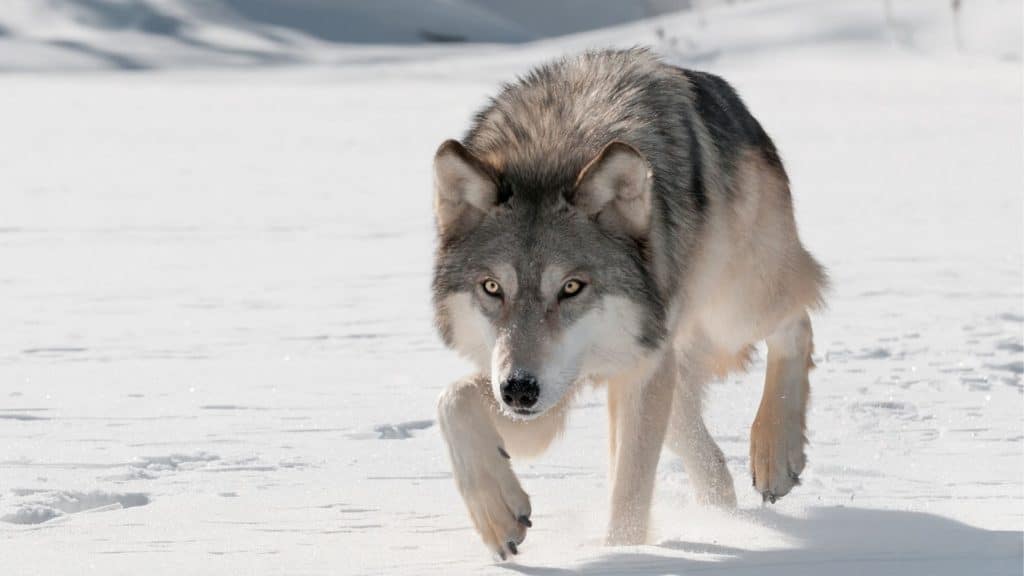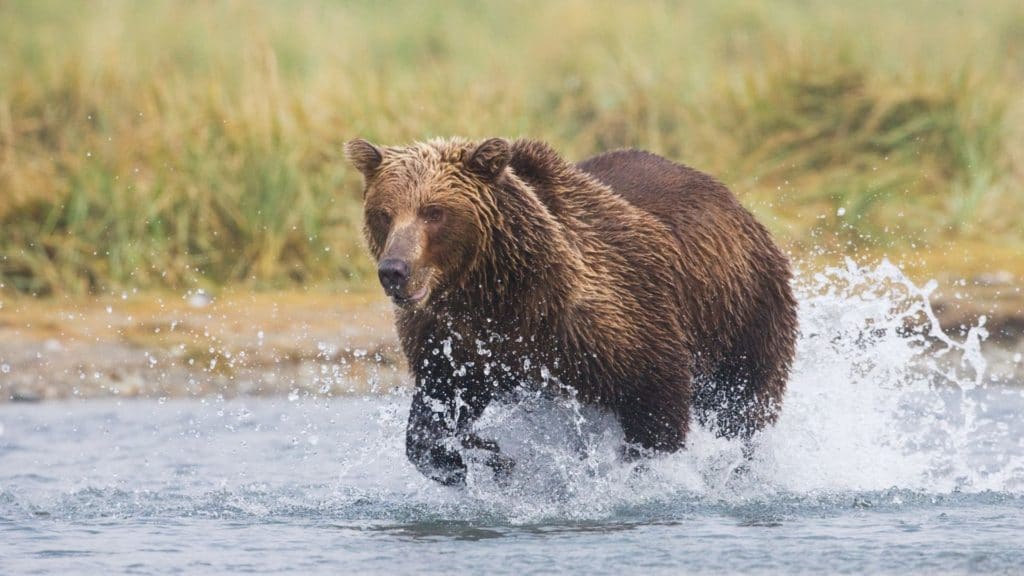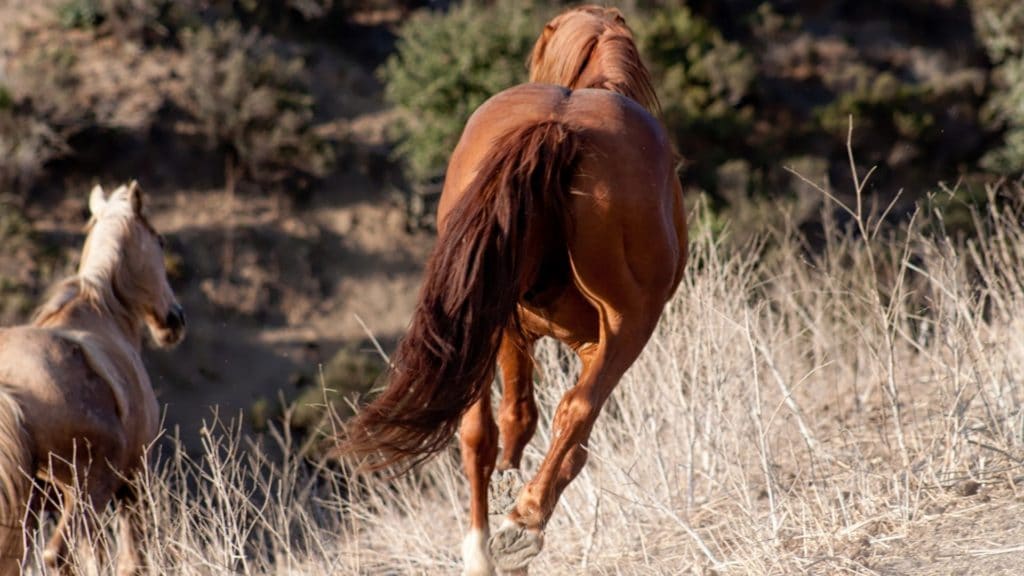Last updated: February 16, 2023
On a recent TV show, a bear ran down a horse and tackled it from behind. This scene made me wonder about the program’s accuracy; couldn’t a horse outrun a bear? What about a cheetah, wolf, or lion? I had to find out what predators can outrun and catch a horse.
Horses can outrun bears in a race. But a bear has a quick initial burst and could catch a horse over a short span, especially in the woods. They can go from zero to 35 miles per hour in a blink. So, a bear can catch a horse even though horses are faster than bears.
The horse’s most significant protection against predators is speed and its keen senses. But do they have the quickness to outrun the fiercest predators on the planet, bears, cheetahs, wolves, and lions?

Can a horse outrun a cheetah?
A cheetah can outrun a horse; it’s one of the fastest animals on the planet. This beautiful wild cat can run up to 70 mph. But cheetahs run only about half their maximum speed when it chases prey, so unlike a bear, they can run for a long time before it starts getting winded and slows down.

If we compare the two animals’ strides, a running horse completes two strides in a second, while a cheetah can take three long strides in the same space.
The cheetah’s flexible spine gives it a unique advantage in acceleration when it begins to run. Within just 2 seconds, it can reach a speed of up to 45 mph. While horses may be able to run for longer distances due to their endurance, few animals can match the cheetah’s ability to sprint over short distances.
Can a horse outrun a wolf?
Horses have the ability to outrun wolves over longer distances when attempting to escape. With their larger size and greater endurance, horses have the advantage. However, it’s worth noting that wolves can reach a top sprinting speed of 35 mph and are known for their fearlessness when hunting in packs.
Despite being smaller than horses, wolves can be deadly in groups and will attack larger animals. When confronted by a pack of wolves, horses typically choose to run and can often successfully escape. However, if cornered, horses will resort to kicking and fighting to defend themselves.

A horse’s kick can kill a wolf, but the sheer number in most packs will likely overtake a trapped horse. Lone wolves don’t typically risk attacking large animals or even wandering near populated areas.
The wolf population in North America was severely reduced by hunters in the past, and ranchers also played a significant role in killing off a large number of wolves to protect their livestock.
However, in recent years, the wolf population in the United States has steadily increased, particularly in the Northwest regions. Therefore, it’s not uncommon to spot a wolf while riding in states such as Montana, Colorado, or Wyoming.
Can a horse outrun a lion?
Horses can outrun a lion so long as they have a warning. Lions don’t like to run long distances and typically choose prey that is easy to catch. That’s why they prefer weak or wounded animals to chase so they can catch them without expending much energy.

If a horse sees a lion from a distance, it flees immediately. For example, desert horses like Arabians and the Namib desert horse are swift and fast. They are common in Africa and are the most likely horse breeds to face a lion.
A desert horse will start running when it first spots a lion and can outrun it with a head start. Because of its quick instincts and high stamina, the horse would likely outrun the lion.
Lions like to go for sure kills and probably wouldn’t waste their time on the off chance it can catch a horse. They typically feed on weak or wounded prey, but if a lion gets close enough, it can quickly pounce, strike out at the horse, and catch it.
Lions may not be as fast as cheetahs, but they are very fast nonetheless. Lions can run as fast as 50 mph. Cheetahs are faster, but lions are stronger. Lions run around 40 mph on average, but there are times when chasing prey that they reach a speed over 50 mph.

Can a horse outrun a bear?
A horse can outrun a bear if it gets an early first step or two, but bears have explosive quickness and can be on top of a horse before it has a chance to react if the horse isn’t alert.
Bears can run around 35 mph, but they have very little endurance. Since bears are such huge animals, they can’t sustain their speed for very long. They’re most efficient at catching prey within the first few yards of their attack.
Black bears are the fastest when it comes to running, and grizzly bears come in second. Polar bears can run around 25 mph. Bears can explode over short distances, but they have no stamina and tire quickly.
On the other hand, horses have exceptional endurance and can typically run two to two and a half miles at the top level of their speed without slowing down much.
With that amount of staying power, few animals could run down a horse. A bear might outrun a horse in very short sprints, but a horse would most definitely outrun a bear over an extended distance.

Running for your life
When you pit a horse against other animals, especially out in the wilderness, the scenario is quite different than timing their speed on a track. All creatures find a higher gear when running for their lives, including predators that must kill to survive.
However, the American Quarter horse is reportedly faster than the Thoroughbred when it comes to short sprints, like a quarter-mile (hence the name). The fastest an American Quarter horse has ever run is at 55 mph. But on average, most fast horses don’t over forty miles per hour.
No horse breed will get to their top speed while darting through the woods. A short burst of speed is needed to escape quick hunters like bears, cheetahs, wolves, and lions.
As I alluded to, horses running speed differs depending on their breeds, but we presume a really fast horse competing against the world’s fiercest predators in our examples.
Horses survived because of instinct and speed.
Horses have alluded fast predators for thousands of years. They survived because they evolved and adapted characteristics that protected their species from extinction, the two most important being speed and instinct.
The horse’s evolution began millions of years ago, and its survival depended on its ability to avoid predators. However, roughly five thousand years ago, horses were domesticated, which decreased their exposure to predators.
Domestication not only protected horses from predators but provided a reliable food source and shelter. But horses’ behavior has changed very little over time, and they are still fast and instinctive animals.
Wild horses travel in herds for protection. If one senses danger, it signals the others by lifting its head high and pricking its ears. This movement immediately notifies all the others to be alert.
Once the danger is confirmed with their sharp vision, they don’t wait around; they bolt to safety. Sometimes though, bears don’t attack; watch the YouTube video below to see an example.
Horses are fast
When comparing predator speed to horse speed, we considered the average speed of fast horses. Time helps measure how fast anything can run, whether it’s an animal or a train. Horses run fast, but it’s hard to assign a specific number that captures their speed.
There are different kinds of horses with various abilities when it comes to speed; for instance, a large draft horse isn’t going to keep pace with a Quarter horse. So, a bear has a better chance of outrunning a Clydesdale than a Quarterhorse.
A running horse’s speed depends on the surface it’s running on, the rider, and the environment. If a horse runs uphill through thickets, it won’t be as fast as running on a flat clear track.
Still, the horse’s breed isn’t everything. Training also plays a significant role in a horse’s running style and capabilities. In the case of racehorses, some are only as good as the jockey riding them.
With a capable rider, a particular horse might shine and be the best horse on the track. Horses might not be the fastest animals, but they aren’t that far behind.
When considering fast animals, very few have the speed and stamina required to keep pace with a horse, regardless of the breed.
FAQS
How fast can a horse run?
The world’s fastest equines are commonly thought to be thoroughbred horses, which are known for their impressive speed and agility. However, studies have shown that the title actually belongs to Quarter Horses, which can reach speeds of up to 55 mph.
How fast can an average horse run?
The average horse can run around 30 mph; this makes them incredibly swift animals. However, some exceptional racehorses are capable of even faster speeds.
Related articles:
- How Do Jockeys Make Horses Go Faster?
- Do Thoroughbreds Make Good Trail Riding Horses?
- Was Secretariat the Fastest Horse to Ever Race?

About the Author: Miles Henry
Lifelong Horseman | Racehorse Owner | Published Author
Miles Henry brings over 25 years of hands-on experience training and owning Thoroughbred racehorses. Raised with Quarter Horses and Appaloosas, he’s spent a lifetime learning from horses—on the track, in the barn, and in the field. Today, he runs a small but successful racing stable in Louisiana and shares real-world insights on HorseRacingSense.com, helping horse owners, fans, and bettors navigate the sport with confidence.
📚 Books: View Miles’s books on Amazon »
🎧 Podcast Guest: Animal Tales Ep. 32 |
YouTube Interview
📩 Newsletter: Sign up for racing tips and horse care advice »
🔗 Follow Miles:
Twitter |
Facebook |
YouTube


